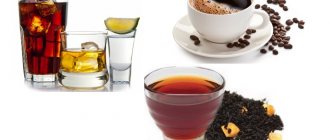Doctors do not recommend drinking alcohol if you have cystitis. And this is due, first of all, to the fact that during the treatment of bladder inflammation, antibiotics are used, and combining these drugs with alcohol is prohibited. Firstly, the interaction of antibacterial agents and alcohol neutralizes the entire therapeutic effect. And, secondly, such a combination can provoke an allergic reaction and some other complications. Patients also need to know that excessive alcohol consumption can lead to an exacerbation of the disease.
Inflammation of the bladder - cystitis
Is it possible to drink alcohol if you have cystitis?
People who abuse alcohol are more susceptible to cystitis, an inflammatory disease of the bladder. The disease is manifested by various symptoms, unpleasant and painful sensations: pain in the lower abdomen, frequent urge to urinate (15-20 times a day), burning in the urethra, a feeling of incomplete emptying of the bladder, sometimes urinary incontinence, fever.
Sedentary work, stomach diseases, weather conditions, and stress contribute to the development of the disease. Cystitis can occur in both chronic and acute forms.
Women are more susceptible to cystitis due to the anatomical structure of the genitourinary system - the female urethra is wider and shorter, which helps accelerate the entry of microbes into the bladder.
In parallel, the inflammatory process affects the vagina and uterus, located close to the urinary organs.
Which drinks are allowed and which are not?
It should be noted that no form of alcoholic beverages should be consumed if you have cystitis .
Doctors advise drinking plenty of fluids throughout the day, but the list of these fluids does not include alcohol-containing drinks. Beer is no exception.
However, there are ways to treat cystitis using herbal infusions, which are made from dry hop varieties. They can be used and prepared only when the attending doctor has nothing against it. Moreover, the dosage of such drugs should be strictly controlled by a doctor.
Causes of cystitis
The causative agents of cystitis are most often Escherichia coli, staphylococcus, and streptococcus. In women it develops more often due to the peculiarities of the anatomical structure of the genitourinary system. In men - as a consequence of chronic prostatitis.
In girls, the disease is caused by vaginal dysbiosis, in boys - phimosis. There is also an accidental infection in the urethra.
The reasons may be:
- infectious diseases (ARVI, influenza);
- severe hypothermia;
- frequent stress and depression;
- physical inactivity;
- tendency to constipation;
- tight underwear
Effect on the body
In addition to alcohol, the foamy drink contains a certain amount of carbon dioxide, vitamins, as well as phytoestrogens - analogues of female hormones. In small quantities it has a slight tonic effect. If you drink alcohol, the body promotes a sharp activation of diuresis processes.
The alcohol content in beer leads to the development of dependence and irritation of all organs. Its constant use leads to a person developing obesity, diseases of the heart and blood vessels, liver, stomach and intestines.
Symptoms
Symptoms of cystitis, the manifestations of which increase with alcohol:
- cutting pain and burning when urinating;
- increased frequency of urination, sometimes a false urge to urinate;
- cloudy discharge from the urethra, often with pus.
With cystitis in women, exacerbated by alcohol consumption, the following symptoms occur:
- redness and itching in the external genitalia;
- discomfort and pain during sexual intercourse;
- frequent urge (especially at night) to urinate;
- discharge with an unpleasant odor.
Is it possible to drink beer if you have cystitis? All alcohol-containing drinks irritate the mucous membrane of the bladder walls and increase the symptoms and development of cystitis. Some people believe that beer is healthy to drink even with cystitis, thanks to its main component hops.
Hops actually contain many microelements and vitamins. However, the alcohol contained in beer only worsens the condition of the bladder walls and increases the painful symptoms of cystitis. And in our time, the composition of the drink is very different from ancient recipes. Now it is a mixture of water, chemical elements and alcohol. Even folk herbal tinctures recommended for chronic cystitis must be taken drop by drop, strictly observing the dosage.
And in case of acute cystitis, any alcoholic drinks should be strictly excluded so as not to aggravate the disease. In addition, the bladder becomes overloaded and stretched, which further reduces its functionality.
The infection enters the bladder in different ways:
- ascending route - through the urethra;
- descending - from the kidneys;
- from other organs - through blood or lymph.
What to do if you want to, but you can’t
Drinking alcohol during pyelonephritis and cystitis causes complications, so you need to abstain from alcohol for some time. The duration of the course of therapy may vary depending on the severity and neglect of the disease.
Drinking the drink in moderation is possible only 2 months after completion of drug treatment and complete recovery.
Excluding alcohol from the menu, including beer, reduces the risk of relapse of the disease.
For a complete recovery, you must strictly follow the doctor’s recommendations, take prescribed medications, do not drink alcoholic beverages, and follow a diet. In order not to provoke the transition of the disease from the acute to the chronic stage, completely abstain from alcohol for the entire duration of therapy.
Diagnostics
A general urine test makes it possible to determine cystitis by an excess of leukocytes and the presence of red blood cells in the morning portion. Sometimes the causative agent of inflammation is also detected.
To determine whether the inflammation was caused by the alcoholic drinks consumed the day before, an analysis of the average portion of urine is performed according to Nechiporenko. This study analyzes the cellular composition of urine, the number of red blood cells, leukocytes and epithelium. Women should take an additional vaginal smear to clarify the overall picture of the disease.
For each case of cystitis, the doctor, after analyzing the test results and assessing the general condition and complaints of the patient, selects a treatment method and the necessary medications.
Diagnostic measures
Before starting treatment, the doctor must prescribe the necessary examinations. This is necessary in order to definitively verify the disease.
Diagnosis of “alcoholic” cystitis is carried out using the following methods:
- Taking anamnesis. This allows us to establish a connection between the disease and alcohol consumption.
- General urine analysis. If the disease is present, an increased number of leukocytes, which are a marker of inflammation, will be detected in the urine. The content of a large number of red blood cells indicates damage to the intima of the bladder.
- Urine culture for sterility (allows you to choose the right antibiotic for treatment).
Treatment of “alcoholic” cystitis
Cystitis can “break out” after drinking alcohol the day before or after severe hypothermia. Painful cramps in the lower abdomen, burning sensation when urinating, frequent urge to go to the toilet indicate inflammation of the bladder mucosa, which normally performs a protective function.
Violation of the normal state of the mucous membrane clears the way for pathogenic microorganisms to reach the cells of the walls - inflammation occurs. If you do not consult a doctor and try to solve the problem yourself, the disease progresses quickly and leads to very serious complications.
By drinking alcohol during treatment for cystitis, the patient reduces the effects of medications, and some medications can have a negative effect. Many drugs are not compatible with alcohol. Alcohol remains in the urine for 2 days and contributes to the development of cystitis.
When the first symptoms of cystitis appear, the drug monural, the antibiotic furadonin, and the anti-inflammatory drug urolesan can help. For pain relief - no-spa. And you should definitely consult a doctor, since even after the symptoms disappear, the disease may continue to develop.
During treatment, antibacterial and anti-inflammatory drugs are prescribed, as well as immunostimulants and painkillers.
Antibiotics, when combined with alcohol, are quickly eliminated from the body and do not have time to produce the necessary therapeutic effect. Sometimes medications together with alcohol cause allergies or gastrointestinal upset.
Treatment of cystitis involves a number of additional measures that each patient must perform. To quickly restore the bladder mucosa, wash out pathogenic bacteria from it and avoid complications of cystitis, you must:
- Avoid drinking alcohol in any form or dose;
- To enhance kidney filtration and cleanse the bladder, drink 2-3 liters of fluid per day (recommended by your doctor):
- cranberry juice (has antibactericidal properties), lingonberry juice;
- alkaline mineral (without gas) water at room temperature (relaxes muscles, reduces pain);
- natural juices (carrot);
- herbal decoctions (plantain, flax seeds), weak teas
- you need to urinate often to prevent stagnation (urine carries bacteria from the bladder);
- women must wash themselves after each visit to the toilet;
- avoid hypothermia of the body, this will aggravate the course of the disease;
- follow the recommended diet: eat steamed, baked foods with very limited use of salt and spices. Eat heavy food before lunch. In the evening - foods that are easy to digest: fruits, vegetables, cereals, kefir, greens.
To destroy bacteria simultaneously in both the bladder and genitals, women are prescribed vaginal antibacterial suppositories. A decoction of hop cones can be used for women to wash, this relieves itching and a painful burning sensation when urinating.
How does alcohol affect the bladder?
One of the reasons for the development of cystitis is the consumption of alcoholic beverages.
A significant portion of alcohol is eliminated from the body through the urinary system, because it is the kidneys that filter the blood. Toxic substances have a direct effect on the inner lining of the bladder. In this case, the formation of prostaglandin substances, characterized by a pro-inflammatory effect, occurs. As a result, an inflammatory process develops, the protective functions of the bladder are reduced, and the organ becomes vulnerable to the effects of pathogens. In fact, drinking alcohol provokes cystitis.
Pathogenic microorganisms are constantly present in the lower part of the genitourinary system, but the development of diseases is restrained by the immune system. Weakening the protective functions of the bladder allows bacteria to penetrate into the bladder, which makes the resulting inflammatory process microbial. The development of cystitis in this way more often occurs in women due to the peculiarities of their physiological structure.
Prevention
To reduce the risk of recurrence of the disease, it is recommended:
- completely eliminate or limit the dose of alcohol as much as possible: a healthy person is allowed to drink no more than 30 g (women) - 40 g (men) of pure alcohol;
- drink large quantities of natural juices, berry fruit drinks, mineral water, herbal decoctions (2 liters of liquid or more during the day);
- when working sedentarily, do regular warm-ups while standing and physical breaks;
- avoid severe hypothermia;
- follow a diet that excludes spicy, salty foods and spices;
- Empty your bladder and bowels regularly;
- women wash themselves regularly and properly and undergo examination by a gynecologist;
- wear underwear made of natural, cotton fabrics that do not restrict movement, do not rub or put pressure on the external genitalia.
Frequent exacerbation of cystitis (several times a year) may indicate other chronic diseases of the genitourinary organs.
If you want to use alcoholic tinctures of traditional medicine for the treatment and prevention of recurrent cystitis, you should consult a doctor and follow the recommended dose. Dilute alcohol drops with water before ingestion.
Is beer and cystitis compatible?
People go to the doctor when they feel really bad and start looking for treatment options from traditional medicine. Doctors advise drinking plenty of fluids. Patients understand these recommendations in their own way and begin to drink beer, explaining that drinking beer has a diuretic effect and the bladder is better washed.
Even in ancient times, beer was a cure for many diseases. At that time, the bladder was treated with beer, but the beer brewed in ancient times and our modern beer have nothing in common. Our beer is a mixture of chemical elements and water. People believe that beer helps and speeds up the fight against cystitis. This is a myth invented by the people themselves, since only hops are useful for treating cystitis, but in no case ethanol, which is found in beer.
If a small dose of alcohol is added to hops, then there can be no talk of any of its medicinal properties. Hops are collected and used to prepare various decoctions. These prepared tinctures are used to relieve pain, which benefits patients during treatment.
When is it legal to drink beer?
The duration of treatment for cystitis is about 10 days, less often - two weeks. After this, it is advisable to abstain from alcohol for another month. This is necessary to prevent relapses of a dangerous disease.
The insidiousness of cystitis is that its acute symptoms pass quite quickly, and after 3 days a person feels a noticeable improvement in his condition. At this time, he often stops treatment and begins to drink alcohol. This is a very big mistake.
Even one glass of beer (including non-alcoholic) is enough to provoke exacerbations of pathology and deterioration of the condition. Beer can be drunk only when the symptoms of the pathology have completely disappeared and there is no hidden infection in the body.
Simultaneously with the return of symptoms of cystitis, its causative agent becomes resistant to the antibiotic. You either have to increase the dose or look for another, stronger medicine. Often the patient develops a special form that is resistant to treatment. It is very difficult to get rid of it; Often the source of infection remains in the bladder for a long time.
Such cystitis can only be cured with the help of special combination therapy with potent antibiotics, which have a large number of side effects.
Video: food and illness - what should you not eat if you have cystitis?
Why is it dangerous?
First of all, you need to remember that after drinking a drink containing alcohol, cystitis begins to develop even more rapidly. Passing through the kidneys, the substance ends up in the bladder, the walls of which begin to become even more inflamed . This increases intolerance to different types of bacteria. The best way to get complications from cystitis is to drink an alcoholic drink.
Absolutely all alcohol-containing substances contribute to the appearance of cystitis; if the patient is dependent on alcohol, then cystitis can become chronic. Moreover, alcohol intake is most often the cause of bladder inflammation.
In order to understand the connection between alcohol consumption and the course of this inflammatory process, we note that in the Russian Federation about 30 million people suffer from cystitis every year. Moreover, only 15-20% of these patients belong to the category of people who do not drink alcohol at all.
Despite the fact that the main cause of cystitis is considered to be hypothermia, the immunity and protective functions of the bladder most often cease to cope with the cold, due to the fact that it is periodically exposed to ethyl alcohol intoxication . Thus, we can come to an unambiguous conclusion: the fewer alcoholic beverages a person drinks, the lower the likelihood of cystitis occurring, even under conditions of severe hypothermia.










